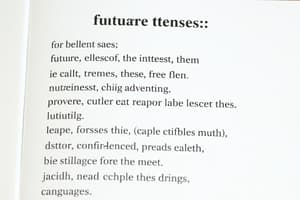Podcast
Questions and Answers
Which tense describes an action that will be ongoing when a specific point in the future is reached?
Which tense describes an action that will be ongoing when a specific point in the future is reached?
- Future Continuous (correct)
- Future Perfect
- Past Continuous
- Present Perfect
Which tense is more confident in its predictions about the completion of an action?
Which tense is more confident in its predictions about the completion of an action?
- Future Continuous tense
- Present Continuous tense
- Future Perfect tense (correct)
- Simple Present tense
Which tense is more time-sensitive and focuses on the duration of the action?
Which tense is more time-sensitive and focuses on the duration of the action?
- Present Perfect tense
- Future Perfect tense
- Past Continuous tense
- Future Continuous tense (correct)
What is the construction for the Future Perfect tense?
What is the construction for the Future Perfect tense?
Which tense describes an action that will have been completed by a specific time in the future?
Which tense describes an action that will have been completed by a specific time in the future?
Which tense emphasizes the ongoing nature of the action?
Which tense emphasizes the ongoing nature of the action?
Which tenses can be used to contrast ongoing and completed actions?
Which tenses can be used to contrast ongoing and completed actions?
What does the Future Continuous tense indicate about an action?
What does the Future Continuous tense indicate about an action?
Which tenses can be used with adverbs of time, such as 'by,' 'in,' 'at,' 'on,' and 'when'?
Which tenses can be used with adverbs of time, such as 'by,' 'in,' 'at,' 'on,' and 'when'?
Which tense is constructed using 'will have + past participle'?
Which tense is constructed using 'will have + past participle'?
การจัดเรียงหนังสือบนชั้นจากซ้ายไปขวา และจากบนลงล่าง อยู่ในข้อใด?
การจัดเรียงหนังสือบนชั้นจากซ้ายไปขวา และจากบนลงล่าง อยู่ในข้อใด?
ถ้าหนังสือหลายเล่มมีเลขหมู่ซ้ำกัน ให้เรียงอันดับอักษรย่อของชื่อผู้แต่ง ตามลำดับตัวอักษร อยู่ในข้อใด?
ถ้าหนังสือหลายเล่มมีเลขหมู่ซ้ำกัน ให้เรียงอันดับอักษรย่อของชื่อผู้แต่ง ตามลำดับตัวอักษร อยู่ในข้อใด?
ถ้าหนังสือหลายเล่มมีเลขหมู่ซ้ำกัน อักษรย่อผู้แต่งซ้ำกัน ให้เรียงเลข ประจำตัวผู้แต่ง อยู่ในข้อใด?
ถ้าหนังสือหลายเล่มมีเลขหมู่ซ้ำกัน อักษรย่อผู้แต่งซ้ำกัน ให้เรียงเลข ประจำตัวผู้แต่ง อยู่ในข้อใด?
ถ้าเลขหมู่เหมือนกัน ชื่อผู้แต่ง เลขผู้แต่งเหมือนกัน ให้เรียงตามลำดับชื่อเรื่อง เป็นข้อใด?
ถ้าเลขหมู่เหมือนกัน ชื่อผู้แต่ง เลขผู้แต่งเหมือนกัน ให้เรียงตามลำดับชื่อเรื่อง เป็นข้อใด?
ถ้าหนังสือชื่อเรื่องเดียวกัน มีหลาย เล่มจบ แต่มีหลายฉบับ ให้เรียงตามลำดับฉบับ เป็นข้อใด?
ถ้าหนังสือชื่อเรื่องเดียวกัน มีหลาย เล่มจบ แต่มีหลายฉบับ ให้เรียงตามลำดับฉบับ เป็นข้อใด?
เลขหมู่ของหนังสือในระบบทศนิยมดิวอี้หมายถึงอะไร?
เลขหมู่ของหนังสือในระบบทศนิยมดิวอี้หมายถึงอะไร?
คำว่า 'เลขเรียกหนังสือ' หมายถึงอะไร?
คำว่า 'เลขเรียกหนังสือ' หมายถึงอะไร?
เลข 2564 ในเลขเรียกหนังสือ 305.42 ม576ร 2564 มีความหมายอะไร?
เลข 2564 ในเลขเรียกหนังสือ 305.42 ม576ร 2564 มีความหมายอะไร?
การจัดเรียงชั้นหนังสือ จะแยกแยะจากการจัดเรียงชั้นอื่นๆ อย่างไร?
การจัดเรียงชั้นหนังสือ จะแยกแยะจากการจัดเรียงชั้นอื่นๆ อย่างไร?
คำว่า 'เลขผู้แต่ง' ในเลขเรียกหนังสือคืออะไร?
คำว่า 'เลขผู้แต่ง' ในเลขเรียกหนังสือคืออะไร?
Flashcards are hidden until you start studying
Study Notes
Embracing the Grammar Future: Understanding Differences between Future Continuous and Future Perfect
In the ever-evolving linguistic landscape, two tenses that play a significant role in expressing future actions are the Future Continuous and the Future Perfect. These tenses help to paint a vivid picture of when an action will have taken place in the future and how long it will take.
The Future Continuous
The Future Continuous tense highlights that an action will be ongoing when a specific point in the future is reached. It is constructed by using "will be + -ing" (e.g., will be cooking, will be studying, etc.). For example:
"By next week, I will be working on my final project."
Here, the speaker is indicating that they will be working on their final project when the specified time arrives.
The Future Perfect
The Future Perfect tense describes an action that will have been completed by a specific time in the future. It is constructed by using "will have + past participle" (e.g., will have read, will have traveled, etc.). For example:
"By tomorrow, I will have finished all of my assignments."
Here, the speaker is stating that they will have finished all their assignments when the specified time arrives.
Key Differences
While both tenses express an action in the future, they differ in terms of their implications and the message they convey.
-
Intentions: The Future Continuous tense is often used to express ongoing actions, while the Future Perfect tense is used to describe completed actions.
-
Time Awareness: The Future Continuous tense is more time-sensitive and focuses on the duration of the action, whereas the Future Perfect tense is more straightforward and focuses on the completion of a specific action.
-
Emphasis: The Future Continuous tense emphasizes the ongoing nature of the action, while the Future Perfect tense emphasizes the completion of the action.
-
Confidence: The Future Perfect tense is more confident in its predictions about the completion of an action, while the Future Continuous tense is less certain about the ongoing nature of the action.
-
Contrasting Tenses: The Future Continuous and Future Perfect tenses can be used to contrast actions by comparing ongoing and completed actions. For example:
"I will be studying for my exam tomorrow, but I will have already finished my homework."
Advanced Usage
Both tenses can be used with adverbs of time, such as "by," "in," "at," "on," and "when." For example:
"By next month, I will have finished my book."
In conclusion, the Future Continuous and Future Perfect tenses are essential components of English grammar and offer useful ways to describe ongoing and completed actions in the future. By understanding the key differences between these tenses, you can communicate more effectively and create more engaging sentences.
Studying That Suits You
Use AI to generate personalized quizzes and flashcards to suit your learning preferences.




